������|���Ŋw�ԁE������w�ԁ|
|
�����F����24�N7��21���i�y�j 13�F00 - 17�F15
�ꏊ:���ʋ��瓏2����211����
�Q����F���� |
�E�ē��y�[�W�@�@�@�E�����̗l�q
�@�@����24�N7��21���i�y�j�Ɏ�������w���ۓ����猤���Z���^�[��Âɂ��A�����V���|�W�E���w������|���Ŋw�ԁE������w�ԁ|�x���J�Â���܂����B�����͑����̕��Ɍ�Q�����������A����ƂȂ�܂����B
�����V���|�̈ē��|�X�^�[�ijpeg�j
���v���O����
13:00�@���A
13:05�@��u��
�@�@�@�@�u�����ɂ������w����v
�@�@�@�@�@�@�@�@�����c���v�i��������w����w���j
- �y�v�|�z
�@�{�ł́C�����Q����(�����s�y�ё哇�S)�ɑ�w��ݒu����K�v���Ɛݒu������@�_���q�ׂ�B�M�҂́C�U�v���ׂ���w�̑g�D�̌`�Ԃ��w�Ȑ��Ɖے����ɋ�ʂ��čl����B�ے����̑�w�͍u�����u���ɏ������鋳��������̉ے������݂��Ɏx�������Ă���B
�@����w���Ȃǂ͉ے������Ƃ��Ă���B�T�C�U���̑哇�L�����p�X�̉ے��̒S�������Ǝ������L�����p�X�̋������u�`���J�u����B�������L�����p�X�̋����͏W���u�`���s���B�w���̒���팸���������Ă��鋳��w���̊w����������p����C���Ɨ������C���w�������ȂǁC�̎������m�ۂł���B
�@�@This report describes the necessity of establishing a university in Oshima County, and the methodology to install. I consider the course system which should invite the form of the organization of the university, in distinction from a subject-of-study system. In the University of the Course System, the teacher who belongs to a lecture organization or a large lecture organization supports some courses mutually.
�@�@The faculty of education has taken the course system. The 5 or 6 teachers
in the course of the Oshima campus and the teacher of the Kagoshima campus
give a lecture of the course of the Oshima campus.
�@�@The teacher of the Kagoshima campus performs an intensive course. If
the student capacity of the faculty of education, which is considering
capacity reduction, is utilized, revenue such as tuition revenue and entrance
fee revenue are securable.
�@�@Is it possible to establish a part of the course of the faculty of education on Amami Islands? This report describes the conditions of teacher's license acquisition, a role of social education, and base formation of research of Kagoshima University, etc.
13:35�@�u�������t�B�[���h�Ƃ�����������w�̊w������Ƒ�w�@����v
�@�@�@�@�@�@�@�@����C���G �i��������w�}���فE���Y�w���j
- �y�v�|�z
�@��������w����Z���^�[�ł́A���ׂɊւ��̂��鋳�������������Ȃǂő̌��^���K������s���Ă����B�����̎��Ƃ́A�w����w�N�����w�����쐼�����̓��X�ŃG�R�c�[���Y����̌�������̂ł������B���̌�A�����P�V�N�ɍ����S���Z���^�[�������S�ƂȂ��Đ\�����̑����ꂽ���ȏȋ���GP�v���O�����u���������琢�E������v�̒��ŁA�����̃t�B�[���h���K���A���ʋ���J���L�������̒��ő̌n�I�ɊJ�u�����悤�ɂȂ����B���[�J���Ȏ��_���O���[�o���Ȋw��ɏ������邱�Ƃ�ړI�Ƃ��邱�̋���ł́A������F�т̓��X�����t�B�[���h�Ƃ��Ċ��p���悤�Ƃ�����̂ł������B
�@���̎��g�݂́A���Ȃ����ʋ���ɂ����Čp������Ă��邪�A����ɑ�w�@�ł������ȉ��f�^�̋���R�[�X�Ƃ��ēW�J����悤�Ƃ��Ă���B
�@�@The Education Center of Kagoshima University has organized several lectures and field trips for undergraduate students in the Amami Islands and other small islands located in the south of Kagoshima Prefecture for more than ten years. Numerous students from many faculties joined these summer classes and enjoyed ecotourism in these islands. Since 2005, Prof. Nedachi, a retired director of the Center, expanded this activity to all the faculties under his program titled �gSee the evidence from the view point of Kagoshima but think from the international standards�h. This program was supported by the Japanese Ministry of Education and Sports as part of their GP Programs in 2005-2009 and recently the activity was managed even for the graduate course of the university.
13:55�@�u���׃T�e���C�g�̎��݁i�C�m�E���m�F�����哇�E���V���j�v
�@�@�@�@�@�@�@�@���K���G�Y�i��������w�@���w���j
- �y�v�|�z
�@�����T�e���C�g�����́A�����ɏZ�݂Ȃ��玭������w��w�@�̐��K�̎��Ƃ���u�ł��鋳���Ƃ����̂�����������ɂȂ��Ă���B�]���A�T�e���C�g�����Ƃ́A�n����w���Љ�l�̗������l���ēs�s���ɐݒu���邱�Ƃ����������B�����T�e���C�g�����́A�t�ɁA�n���̑�w����������̋@��̏��Ȃ������̎Љ�l�ɂ��̋@������Ƃ������̂ł���B�������������T�e���C�g�����́A2003�N4���̋��ؖ�T�e���C�g�����̊J�u�Ɏn�܂�A���N7���ɖ@���w���������̖����s������T�e���C�g�����J�u�̗v�����Č����̌��ʁA10���ɊJ�u�����F�������ƂɎn�܂�B���̌�A11���ɃT�e���C�g�����̌��n�������і����s�Ƃ̊o���̒����킳��A2004�N4���ɉ����s�̒��������ق̋�������ĊJ�u�����B��1������5���̉Ȗړ����C���Ɖ����ݏZ��1���̑�w�@����6���ł������B2006�N3���ɂ͉����s�Ǝ�������w�Ƃ̊Ԃŕ�A�g���肪��������A�ꌤ���Ȃ̎��g�݂��玭������w�S�̂Ƃ��Ă̎��g�݂ɔ��W�����B�܂��A���V�������́A2006�N10���ɓ��V�����ŃT�e���C�g�����̊J�u�����Ƃ��Č��J�u�������{���A���n��������J�Â�����A2007�N4����7���̉Ȗړ����C���ĊJ�u�����B���݂܂ł�8�N�ԂɁA�C�m�ے��C���҂�5���ƂȂ�A2009�N4���ɉ����T�e���C�g�o�g�҂����߂Ĕ��m����ے��ɐi�w���A3�N���2011�N3���ɔ��m���擾��1���ƂȂ����B2012�N4���ɂ�2�l�ڂ̔��m����ے��i�w�҂��o�Ă���B�{���\�ł́A��������w�̂���܂ł̉����T�e���C�g�����̎��g�݂�ۑ�A�����哇�Ɠ��V�����邢�͉����ɂƂ��ẴT�e���C�g�����̈Ӌ`�Ȃǂɂ��čl�@�������ĕ���B
�@�@�gYou can attend a class of Kagoshima University graduate school while
living in Amami Oshima�h is the catch-phrase of the Amami Satellite Class.
Prior to the Amami Satellite Class, other satellite classes had often been
set up in urban areas by local universities for the convenience of working
people. The Amami satellite class, on the contrary, intends to provide
the opportunity for advanced education to the people in remote islands
who have less opportunity for it. The Amami satellite class can be traced
back to the opening of a satellite class in Kushikino city in April 2003.
In July the same year, the Amami Mayor visited the Dean of the Faculty
of Law, Economics and Humanities and made a request for offering satellite
classes in Amami. In November, the signing of an exchange agreement with
Amami City was made. In April 2004, the Amami satellite class started at
a room in a community hall of Amami city. The first batch of students was
5 credited auditors and 1 graduate student who lived in Amami City. The
Tokunoshima class started in April 2007 with 7 credited auditors. During
the last 8 years, 5 students got a master�fs degree and 1 student gained
a doctorate. In this paper, I will talk about the attempt to establish
Amami satellite classes by Kagoshima University, and also the significance
and meaning of satellite classes for Kagoshima University and Amami.
14:15�@�x�e
14:25�@�u���̎d�g�݁i�^�_���j�E���w�T�_�i�C�m�F���V���E�������j�v
�@�@�@�@�@�@�@�@����c�L��i��������w���ۓ����猤���Z���^�[�j
- �y�v�|�z
�@���ۓ����猤���Z���^�[�ł͋��ʋ���Ȗځg���̂����݁i�W���u�`�j�h��^�_���ŊJ�u���Ă���B��w�@�����f���đ̌n�I�ɗ��C����v���O�����u���w����R�[�X�v�̃R�A�Ȗڂł��铇�w�T�_�T�ƇU�̈ꕔ�𗰉����ƒ��V���ŊJ�u���Ă���B���������̓����Ƃ��Ď������s�Ƃ���ȊO�̎����̂̋K�͂̈Ⴂ�A����Ɨ����̑��݂���������B�����ł͊C���A�u��A�������Ȃǂ̐���̒��ŁA�D�ꂽ���R���̒��ŋM�d�ȗ��j��������ĂĂ���A�n��̑��l�����ۑS����Ă���B�܂��A�����̒n��Љ�ł͓`���I�ȋ����̂��n�抈�����̌����͂ƂȂ�A����̉p�m�Ɠw�͂ɂ�葽�푽�l�Ȓn�您�����̎��g�݂��s���Ă���B�����̎��Ƃł͌o���L���Ȏ����҂ɂ��u�`�����S�ƂȂ��Ă���A�����̌�������g�݂ɂ��ė�������ƂƂ��ɒn��Љ�݂̍���⊈�����ɂ��čl����@�����Ă���B
�@�@The Research Center for the Pacific Islands has opened a common educational subject, �gAn Island�fs System�h, in Yoron Island, and also core subjects of a program "Island study educational course" for graduate school, �gIsland study I and II�h, in Iwojima Island and Nakanoshima Island. In the community of the islands, a traditional community serves as a driving force of regional vitalization, and the measure of various local revitalization is taken by its wisdom and efforts. The lectures by the working members with a rich experience have taken the lead and understand the present condition and the measure of islands.
14:45�@�u�Տ�����̏�Ŋw��ŗ~�������Ɓi�������j�v
�@�@�@�@�@�@�@�@�����ˏ㌒��Y�i�F������s����Őf�Ï��j
- �y�v�|�z
�@�ŋ߁A�u������Âƈ�w����v�Ƃ������t�����܂��a���Ȃ��~�߂���悤�ɂȂ��Ă������A���̔w�i�ɂ́A�Ⴂ����Ɂu�n���Áv�A�܂�u�����f�Áv��u�v���C�}���P�A�v�ɑ���S�̍��܂肪����Ƃ����Ă������낤�B��������w�̒��ɂ�������Íu�����J�݂����ƁA������Â��ϋɓI�Ɉ�w����Ɏ�������A���ł͂��ׂĂ̈�w�����������炩�̌`�ŗ�����Î��K�ɎQ�����Ă���B
�@����A����16�N�x����n�܂�������Տ����C���x�ł͗����̏����Ȑf�Ï����n���Ì��C�̋��͎{�݂Ƃ��đg�ݍ��܂�Ă���A������Ì��C����]���錤�C��͑����B�������҂����̊ԂɁu�n���Áv�ɑ��鋻�����L�����Ă���؋����낤�B���Ƃ��ƈ�w���ɐi�قƂ�ǂ̎�҂����̐S�ɂ́A����������ƒn�ɔ�э���ł݂����Ƃ����v��������Ǝv���Ă��邪�A�v�͂��̂悤�Ȏ�҂������ǂ���Ă邩�ŁA���Ȃ��Ƃ������̑�w�a�@��s�s���̑�a�@�ł̌��C�ł͐���͈�Ă��Ă��n��ɕK�v�ȑ�����I��t�̗{���͓���B�����₤�̂������ƒn��ÂŁA�n��Z���̖ڐ��Œn���Â�̌����Ȃ���n����w�сA�n��Z���Ɋw�ԂƂ����p�����d�v���Ǝv���Ă���B���������Â͍Ő�[�̈�ÂƂ͒��������E�����A�������A��������э���ł��邩�킩��Ȃ�������Â͏��ɖ{���̑����f�Âƌ����Ă��ߌ��ł͂Ȃ��A�s��̑�a�@�ɂȂ����̂���邱�Ƃő��ݕ⊮�I�������S���o������̂Ǝv���Ă���B
�@�u������Â�̌����ď��߂Ĉ�w���ɓ�������낱�т������ł����v�ƌ����Ȃ��炻��܂ł̊w����������ς����A�ڂ��P�����Ă����w���������B������Âƈ�w����ƌ����Ă�������������̂ȂǂȂ��B�������̗�����Â����Ă��炢�A�����������Ă��炦�����B�����Ď�҂̐S�������Ƃ��o����Ɗ���Ă���B
�@�@In recent years the (association between) terms �gremote island medical
care�h and �gmedical training�h have started to be accepted without any discomfort.
One could speculate this to be the result of increasing interest amongst
young generation in �gregional medicine,�h i.e. �ggeneral practice�h and �gprimary
care.�h When Kagoshima University opened seminars on remote island healthcare/medical
care, it became actively integrated as part of the training, and currently
every medical student is partaking in remote island medical training in
some form or another.
�@�@On the other hand, the post-graduate clinical training system incorporates
small clinics on remote islands as training affiliate centers, and there
are many trainees requesting to participate in this scheme. This appeal
may evidence the widening interest in regional medical care. Amongst these
students one could imagine a majority of these young trainees wanting to
go to remote islands or isolated areas. However, as it stands currently,
training in settings such as university hospitals or in large hospitals
in cities produces specialists but it is hard to train them as general
practitioners, the type crucial to regional welfare. Learning medicine
on islands can supplement this. It is also important to experience and
learn regional healthcare from the perspective of the local residents and
at the same time learn about the land. Medical care may be far from forefront
of medicine, but it is not an exaggeration to say that the medical care
on remote islands equates to true general practice/comprehensive medical
care as they may have to deal with unanticipated cases at all hours of
the day. By offering what cities�f large hospitals cannot provide may contribute
to mutual and reciprocated role-sharing.
�@�@There was a student whose student life was transformed: he said �gexperiencing
remote island medical care has brought me joy since joining medical school.�h
There may not be many technical elements that could be learned from remote
island medical training, but one wishes for young trainees to see the raw
form of the medical care on remote islands and be moved by it.
15:05�@�u�����ȓ��̋��猻��ōl����i�������j�v
�@�@�@�@�@�@�@�@���w�����[�E�W�����\���i��������w���ۓ����猤���Z���^�[�j
- �y�v�|�z
�@�����2012�N7���ɖK�ꂽ���������������ւ̒Z���������s�Ɋւ���R�����g�ł���i�j���[�W�[�����h�Ƃ̎�̔�r���܂܂��j�B���̗������ւ̗��͎�������w���ۓ����猤���Z���^�[�ɂ���w�@���ւ̋���v���O�����̈�Ƃ��Čv�悳�ꂽ�B���n�������s�����Ƃ͍���A�����̌�������ɂ����Ċ�{�I�v�f�ł���A����I���_����̂��̂悤�Ȋw�K�ɂ́A�l�X�ȉ�����Ӗ�������B���n�����ɂ́A���̍ł��L���Ӗ��ɂ������b�I���@�_����łȂ��A�I�w�K��̌��I�w�K�Ƃ������H���܂܂��B�I�w�K�ł͂��̒����������Ȃ�����ɂ�����w�K�̎��H�����������B�܂��A�̌��I�w�K�ł́A�w�K�o������̈Ӗ��̐������d�������B�����̋��痝�_�͂���������n�����ɂƂ��ďd�v�ł���B�Ƃ�킯�A���Ŋw�Ԃ��ƂⓇ����w�Ԃ��Ƃ�ړI�Ƃ��鋳��I�ݒ�̂��ƂŁA�����ׂƂ��������ɂ����Ă͂Ȃ�����ł���B���̔��\�̖ړI�́A�����̊w�K�̓�̗̈�ɏœ_�Ă邱�Ƃɂ���āA����̌��n�������s�Ɋւ��鎄���g�̊w�K�o���ɂ��Ă�������ƍl���Ă݂邱�Ƃɂ���B����ɁA���̃R�����g�́A�����g�̖ړI��o���A�ώ@��ᔻ�I�ɒT������ċA�I�A�v���[�`�Ɋ�Â��Ă���B
�@�@This is a commentary on a brief field trip in July 2012 to the small
island of Iwojima in Kagoshima prefecture, Japan (I will also include some
comparisons with New Zealand). The trip to Iwojima was organized as part
of the programme for graduate students affiliated to the Research Center
for the Pacific Islands, Kagoshima University. Undertaking field study
is a primary component of many fields of research, and from an educational
perspective such an exercise has various assumptions and implications.
As well as the underpinning methodologies of field research in its broadest
sense, which can be approached from numerous different perspectives, these
include the practice of situational learning and experiential learning.
Situational learning emphasizes the practice of learning in the context
in which the research is applied, and experiential learning concerns the
generation of meaning from learning experiences. Both of these areas of
educational theory have significance for field study, especially in a small
island context in an educational setting that aims to learn on and from
the island. In this paper my aim is to reflect on my own learning experiences
of this field trip by focusing on these two spheres of learning. Moreover,
my commentary adopts a reflexive approach by critically exploring my own
objectives, experiences and observations.
15:25�@�x�e
15:35-17:00�@�������_
�������̗l�q
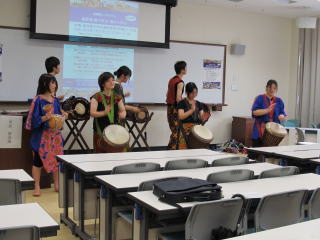 |
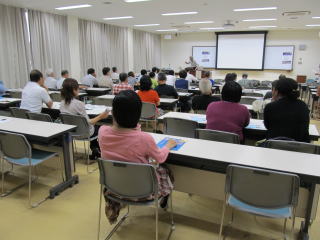 |
�V���|�W�E���̑O�Ɏ���W�����x�T�[�N���̉��t
|
�V���|�W�E���J�n
|
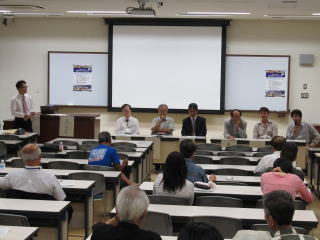 |
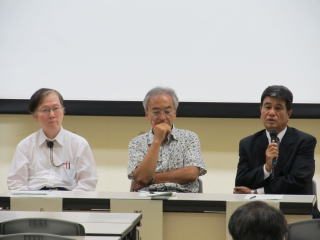 |
�������_
|
���c�搶�A��C�搶�A��c�搶�i������j
|
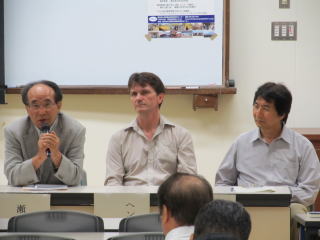 |
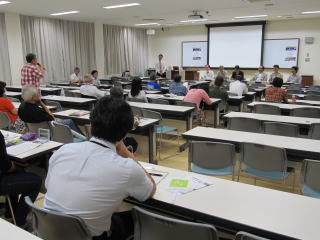 |
| ���ˏ�搶�A�w�����[�搶�A�K���搶�i������j |
��ꂩ��̎��� |
���₢���킹��
��������w���ۓ����猤���Z���^�[�@�@��890-8580�@�������s�S��1-21-24
�d�b099-285-7394�@�@FAX099-285-6197�@�@E-mail: shimaken@cpi.kagoshima-u.ac.jp |